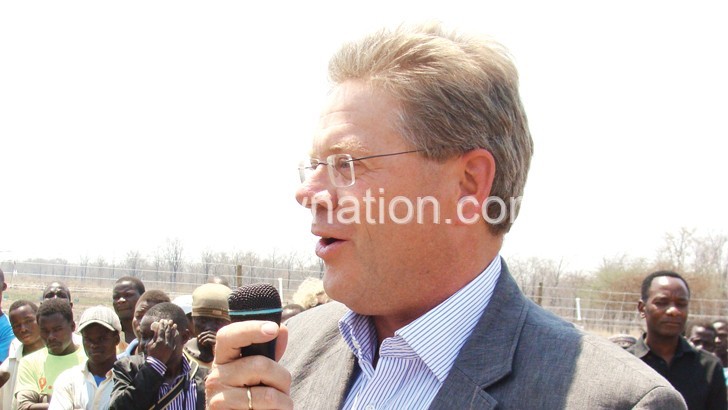Malawi weak link for organised crime—Germany
Germany says Malawi has become a weak link for traffickers smuggling out ivory and other illicit goods, endangering the country and the region’s wildlife.
The country’s weak legislation on trafficking and corruption in border posts and airports has been singled out for worsening the situation.
Speaking in an exclusive interview on efforts alongside Sadc and other regional neighbours in tackling trafficking, Germany’s envoy to Lilongwe, Peter Woeste, said more needs to be done to tackle the challenge, but regional cooperation was crucial to finding a solution.

He said Germany was planning to provide technical support; including boosting the sniffer dogs departments of police and immigration.
“Malawi is one element of a bigger problem and topic and Malawi unfortunately is the weakest part of the chain. Wildlife trafficking is part of organised crime and is a very lucrative part of organised crime. It is happening in the whole region of eastern and southern Africa.
“We have had incidents where wildlife products have been brought through the airports in Malawi which is rather illogical as we are a landlocked country. Why should criminals from Tanzania, for example, bring products first in Malawi then ship them out. It shows that Malawi infrastructure is attracting these criminals,” said Woeste.
He said there is a need for the country to also improve anti-trafficking legislation and welcomed cooperation from China-one of the East Asian countries which is preferred destination for illegal wildlife products.
According to experts, Malawi for years has been under the radar of international efforts fighting trafficking due to its small size and relatively small number of wildlife.
However, concerns are now growing that apart from threats to Malawi’s own wildlife, its porous borders and weaker justice systems are endangering the international effort to tackle illegal wildlife trade.
Woeste, however, applauded Malawi for several steps taken to tackle illegal cross-border poaching and trafficking including the signing of a conservationist agreement with neighbouring Zambia.
A report issued by the German government says poachers are taking advantage of “corrupt practices, weak legislation and an acute lack of resources”.
The report notes, however, the fact that Malawi itself does not have large populations of wildlife, means “every rhino or elephant lost must be considered a significant loss to the country.”
Director of the Department of Natural Resources and Wildlife Brighton Kumchedwa acknowledged the challenges cited by Woeste, including weakness in legislation and corruption.
He, however, said government has established an inter-agency committee, which include the Anti-Corruption Bureau (ACB, police and immigration, to tackle the corruption facet of the problem while also addressing weaknesses in the law.
“GIZ is helping us review our legislation. We are working on policy papers proposing stiffer penalties and we are at an advanced stage in the proposed laws. Indeed what the Ambassador has told you is very true; our laws are very weak which have made Malawi attract traffickers,” said Kumchedwa. n





